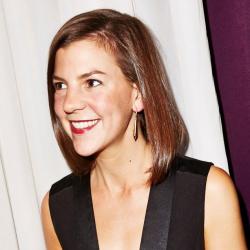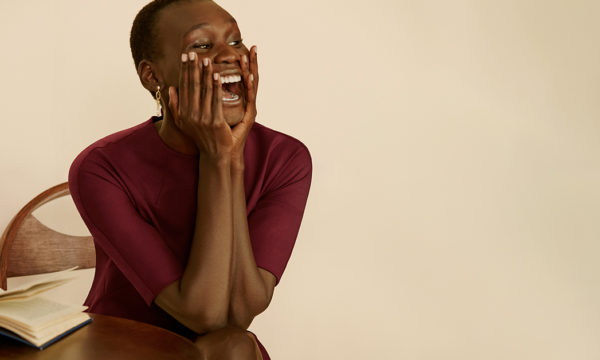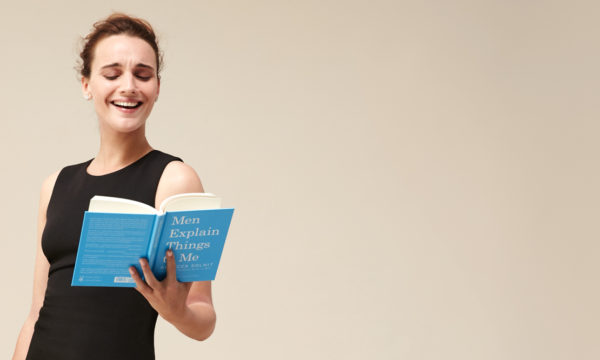Career Advice From Cathie Black: Don’t Take Rejection Personally
September 26, 2017 | Filed in: Woman of the Week
It’s impossible to pin down what Cathie Black, one of the biggest trailblazers in the publishing world, is best known for. In the early years of her career, she was part of the pioneering ad sales team that helped start Ms. magazine—a tough proposition when “feminism” was regarded with suspicion, to put it mildly. She went on to become the first female publisher of New York Magazine, the president and publisher of USA Today, the president of Hearst Magazines (home of Harper’s Bazaar, Cosmopolitan, Esquire, and Town & Country), and the New York City Schools Chancellor, in that order (see above re: impossible to pin down). Nowadays, she commits herself to helping other women succeed in their careers, which is how she came to be on a panel with MM.LaFleur’s CEO and co-founder, Sarah LaFleur, a few months ago. Cathie recently invited us to her apartment in Manhattan to discuss first impressions, job advice, and asking for “the whole loaf of bread.” (Her black lab, Maddie, offered some good tips on the latter point as well.)
A COUPLE OF YEARS AGO, after Hearst and my experience as New York City Schools Chancellor, I decided to get into angel investing, and made a conscious decision to work with female founders. I’ve always been very keen on women’s issues, and being around people who are eager to learn keeps me invigorated and pumped up. Today, I’m speaking with you, then a group from a startup, and then someone who wants job advice. My schedule always has variety like that. This is how I came out of the womb—I’m interested and curious, and my energy comes from people. Of course, I like my downtime too, but I’m definitely an extrovert. I’ve always loved working, even when I had two small children, and I have no desire to turn off the clock.
WHEN I WALK INTO A CROWD, I’m very comfortable going up to anyone, putting out my hand, and saying, “I’m Cathie Black.” Young people ask me what to do when they come to an event and don’t know anyone, and I say, “Just walk up to someone and introduce yourself.” For some people, that’s very hard. But it doesn’t have to be so bad—it’s not like anyone’s going to turn their back on you.
I’M FROM CHICAGO, a very vibrant city, and most of my family still lives in that area. I was a salesperson from a young age; I had summer jobs at Saks Fifth Avenue when I was in school, not because I had to, but because I liked earning a paycheck. After college, my father secretly hoped I would come back to Chicago, but I knew I wanted to be in New York.
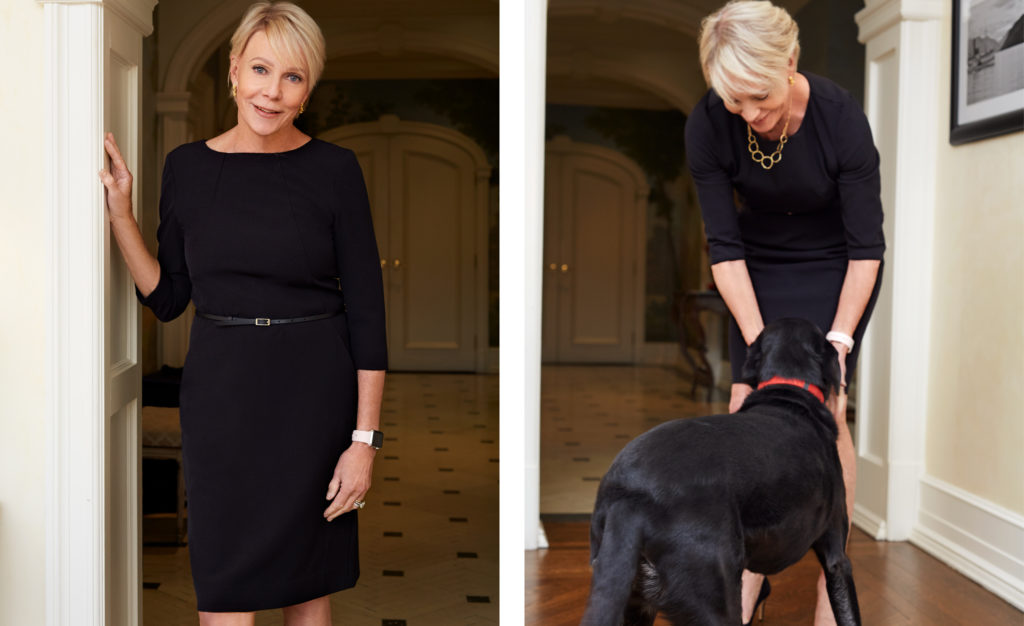
Cathie wears the Etsuko dress in black, the Helene necklace, and the Callisto earrings. Maddie wears a chic red collar.
WHEN I CAME TO MANHATTAN, my father gave me a little money—and I mean a little—and said, “You can’t sign a lease until you can pay rent.” I interviewed for a bunch of jobs. As an English major, I thought I would go into editorial or advertising of some sort, and while I didn’t have a specific plan, I did have a lot of ambition. I interviewed at J. Walter Thompson, a huge ad agency, and said, “I’m here to talk about the executive training program.” The guy looked at me and said, “Well, that’s for men.” I said, “How could that be just for men?” He got this expression on his face, and he said, “Someone like you will work for a year or two, get married, have kids, and leave, and we’ll have invested our time in training you.” I said, “But that’s not my goal at all. I love advertising. I love publishing. I want a big career.” It ended there. They offered me some nothing job, which I didn’t take.
I GOT MY FIRST JOB through one of my college friends. She was working at a large magazine company that published Ladies Home Journal and Holiday, and she connected me to the personnel officer. They didn’t have any openings in editorial, but they asked if I’d consider something in sales. So I started out at Holiday magazine as a sales assistant. In that era, the word “assistant” meant a great deal to me, because it wasn’t “secretary.”
MY FIRST BOSS AT HOLIDAY left after I’d been there for about a year, so I went down the hall and asked for her job. They said yes, but only offered me a teeny-tiny raise. I had some idea of what my boss’s salary had been, so I asked if they would give me that instead. We settled on something in the middle. How I had the nerve to ask for that, I’m not sure. I always say, “What’s the worst that can happen? You may not get the whole loaf of bread, but if you go from having two pieces to somewhere closer to half of the loaf, it’s well worth asking for it.” Part of it is the way you present yourself. I think women have to be confident and not embarrassed about trying to negotiate their financial package, and that comes from showing how valuable you are. I encourage people to be aggressive.
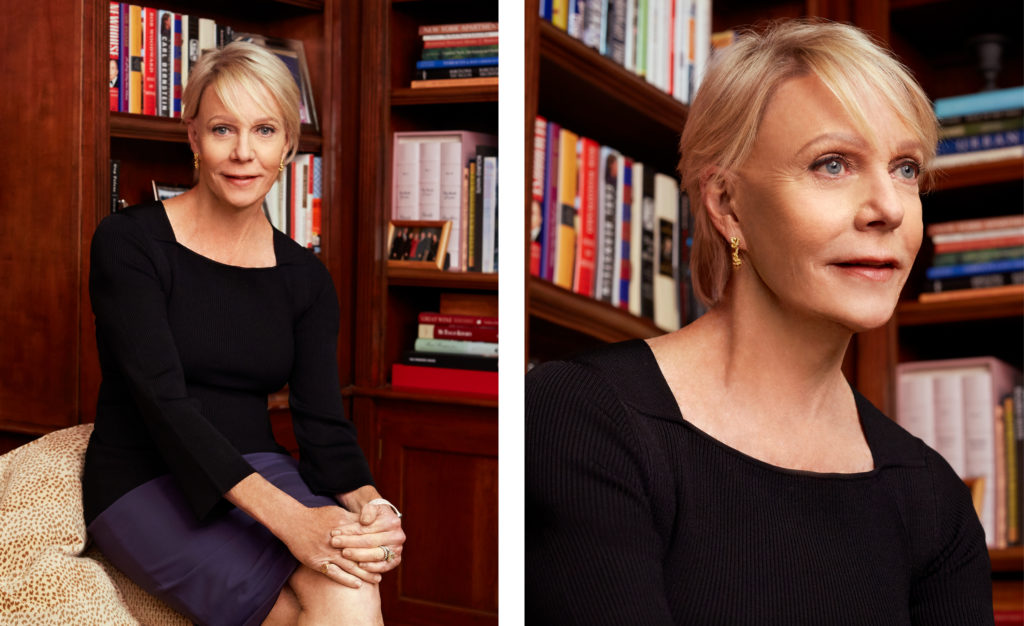
Cathie wears the Lahiri topper in black, the Cobble Hill skirt in elderberry, and the Callisto earrings.
WHEN I WENT TO NEW YORK MAGAZINE to be on the ad sales staff, that publication was just stars in my eyes, and it was a blast. It was a new magazine then, edited by Clay Felker and full of young people, and hot editorially; people were always talking about whatever the cover story was. Then, when Ms. magazine got started in 1972, I was offered the position of ad manager, which was a great opportunity. Still, back in the early days of the women’s movement, selling a magazine called Ms. to national advertisers was very, very tough. People didn’t understand what the word “feminism” meant. They’d heard of [the magazine’s co-founder] Gloria Steinem, but many of them were kind of put off by her. I just blazed ahead thinking, “I’m going to learn more at this place than I ever would at a traditional company like Condé Nast.”
MS. WAS REALLY DIFFICULT. When we had appointments with prospective advertisers like Oldsmobile or General Motors or Ford, they would look at us like we were from outer space. We were threatening their life order: In most cases, we were talking to a man, and we knew he was thinking, “I’ve got this great life. I have a couple of kids; my wife stays home and takes care of them. What if I come home and she says, ‘I want a job?’” They asked us about that, and they were kind of hostile. Situations like that help you get tougher skin and not take things personally. It’s important to remember that: Don’t take things personally. If someone rejects you, it’s because they don’t have enough information; just go back with something more persuasive. I’ve been pretty fearless and spirited in my career, in terms of just not taking no for an answer and figuring out how to get around it. Have I had disappointments? Of course. But you don’t ever get everything you want.
ONE OF MY ROLE MODELS WAS THE PUBLISHER AT MS., a fantastic woman named Patricia Carbine. She had been an editor during the Vietnam era, and she was a beautiful Irish woman from Philadelphia with nerves of steel. She was so committed to the magazine, and I looked at her and thought, “That’s a woman who’s a publisher. I want to be a publisher.” There were other women I looked up to, as well. But it was difficult when women who had pretty much killed themselves to get to their level didn’t want to associate with something called “Ms.” or “feminism,” because at that time, it was extremely controversial. That hurt.
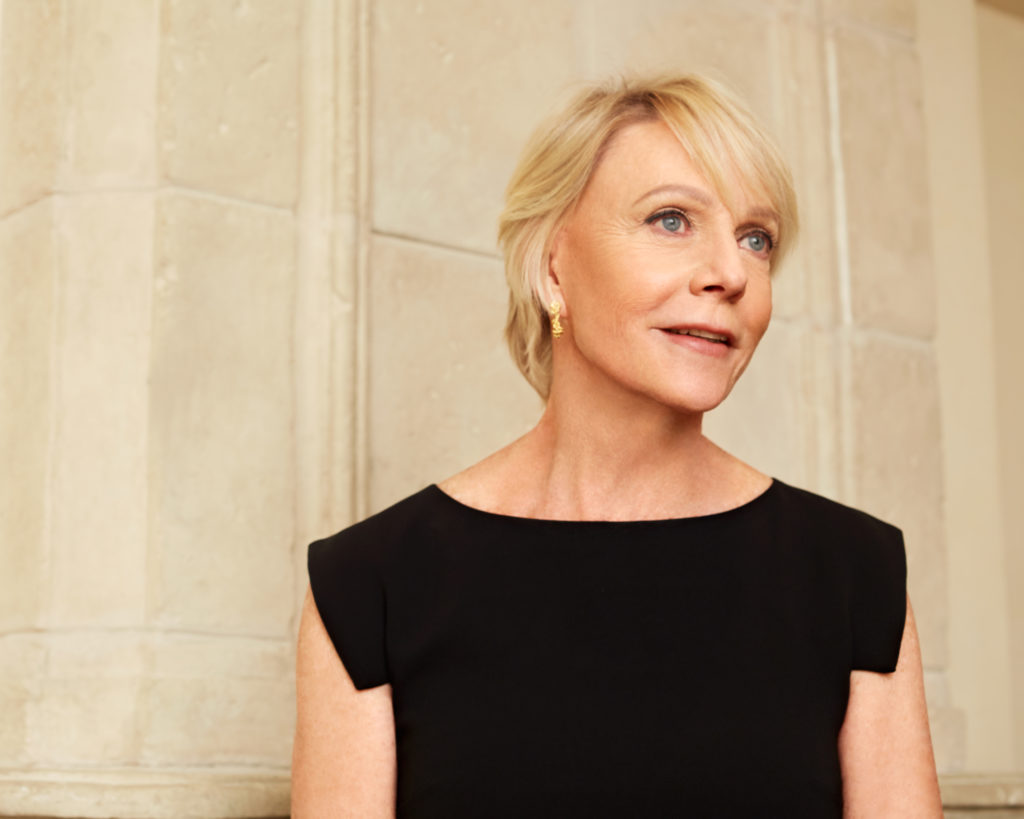
Cathie wears the Callisto earrings and the Sarah 7.0 dress in black.
I’VE ALWAYS THOUGHT, “If I do really well, I am going to make it easier for the next woman to get that promotion or raise.” It seemed particularly important in the ‘80s and ‘90s, although it still is today. I’ve had so many people say to me, “When I saw you on that stage, or met you at that event, I thought, ‘I can do that, too, and I want to know how.’’’ I take that very seriously. I’m not a serious person, but I’m a thoughtful person. Every time I hear of a woman being promoted to a big, C-level job, I’m like, “Yay! Keep it going.” We still read stories too often that make us think how little has changed.
BY THE TIME I GOT TO USA TODAY, I’d been publisher of New York Magazine for about seven years. I’d also spent a little time in California working for Francis Ford Coppola. He owned a small magazine in San Francisco, and I had the San Francisco bug, but the magazine didn’t work out. When I was recruited to USA Today, I thought, “This is going to be unbelievably big.” But I don’t think I understood how hard it would be. This was one of the nation’s first four-color newspapers, and the New York Times and Wall Street Journal looked at it with total disdain. So there I was again, trying to sell something that people thought wouldn’t be around for longer than a year. We proved them wrong. It was an extraordinary seven years and more hard work than I’d ever done in my life, probably akin to a startup today. But instead of being in a shared workspace or someone’s living room, staring at your co-founder, we were on an airplane every day, flying across the country, calling advertisers. It was the craziest schedule. I’m smiling even telling the story, because it was such a wild ride.
AT EVERY POINT IN MY CAREER, I’ve stopped and thought, “How do I want to present myself today?” That includes questions like: “Where am I going? Who are my meetings with? Do I have a lunch date? Am I going to something in the evening?” I don’t lay out my wardrobe the night before—I’ve never been that organized. But it goes back to the simple maxim: First impressions are lasting impressions, and when you meet somebody, you notice how they look. I spent years at Hearst, which publishes fashion magazines, and as president, I was aware of having to look the look. I’ve always worn pants and jackets or a dress. I’m generally in high heels, but with flats in my bag. I don’t get crazy about fashion, but I like looking good and getting dressed up—and feeling confident in what I’m wearing.
Photographs by Maria Karas.






